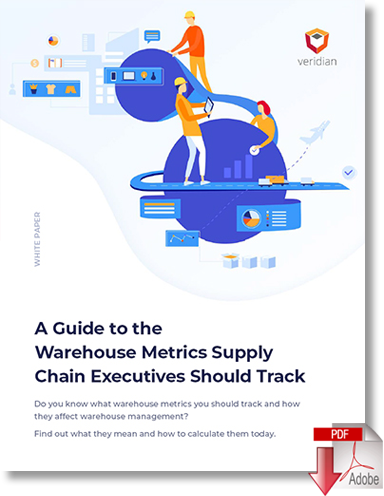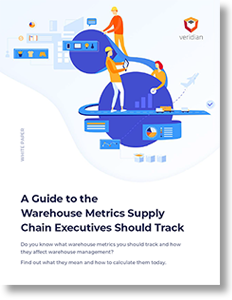What's Driving Interest for a Warehouse Management System in the Cloud?
Interest for a Warehouse Management System (WMS) in the cloud has risen as companies attempt to stay competitive with Big Box Retailers and Amazon, but those are not the only factors driving investment in cloud-based WMS.
For instance, companies may inherit a new WMS in the cloud as part of the deployment of a new system or application, notes Shane Starr of Explore WMS.
For others, the potential ROI of a WMS in the cloud is too much to resist.
Ultimately, supply chain executives need to understand the challenges of a traditional WMS, and why a Warehouse Management System in the cloud is a viable solution with key benefits.
Challenges of Traditional WMS
A conventional, on-premise WMS comes with several problems in globalized supply chain management, including:
- Limited scalability or functionality of on-premise WMS. Since an on-premise solution is limited by the internal IT resources of your company, it may not be possible to expand its functions and size to meet increased e-commerce and omnichannel demands.
- Technical limitations. These limitations include the inability to leverage analytics, robotics, automation, and new technologies. Since modern supply chain technologies can speed order fulfillment and shipping, technical limitations amount to poor customer service and limited, if any, visibility.
- Cybersecurity risks. A traditional WMS also carries significant cybersecurity risks. Although older systems may not be designed to connect to the Internet and share information, their base functions can still be disrupted if a cyber attack occurs. This puts the information about your company and its consumers at risk. However, a modern Warehouse Management System in the cloud can restore cybersecurity with the latest encryption protocols and firewalls.
- Customer service levels. Traditional WMS simply told the company where a product was and when it would ship. Today’s consumers want to be informed of every step of the journey, tracking their shipments online, and getting notifications automatically. Traditional WMS may lack this capability, so consumers are more likely to shop with your competitors.
And The List Goes On And On
Unfortunately, consumers do not care what challenges a company may face.
They want to know that when they order a product, it will arrive as expected and without unreasonable costs, asserts Modern Materials Handling.
Download: Warehouse Metrics Supply Chain Execs Should Track
In most cases, consumers will expect free shipping altogether.
Thus, it is in the best interest of the company to consider upgrading to a Warehouse Management System in the Cloud.
What’s a Warehouse Management System in the Cloud?
A Warehouse Management System in the cloud solves the challenges of a traditional WMS by moving the implementation, maintenance, and use of a WMS from an on-premise solution to web-based platforms.
As a result, companies can access vast resources without the stringent investment of upgrading all terminals, software, and devices throughout the company reports Supply Chain Digest.
At the same time, a Warehouse Management System in the cloud offers a blending of other software that would have incurred additional investment costs, such as a warehouse control system or warehouse execution system.
Depending on the vendor, cloud-based systems offer the functionality to replace an entire suite of applications and streamline warehouse and supply chain management, from procurement through final delivery.
The Benefits of a Warehouse Management System in the Cloud
Moving operations to a Warehouse Management System in the cloud offers benefits beyond moving maintenance and management of the system to a third-party. These include:
- Near-zero lag time
- Logical order streaming
- Lower cybersecurity risks
- Limitless scalability
- Accessible across all warehouses and supply chain partners
Start Thinking About Moving Your Operation to the Cloud Today
Supply chain executives that hope to stay competitive need to seriously consider the benefits of using a Warehouse Management System in the cloud over existing solutions.
Moreover, the cloud’s benefits are ideal for creating and testing new modules and capabilities, so a cloud-based solution will always be evolving, offering the latest and most significant improvements for your warehouses.
Veridian, a Manhattan Associates, HighJump, and JDA Software warehouse management system implementation company, can help you realize your supply chain success. Request a FREE consultation with a supply chain professional now.
Related Article: Maximizing Your Warehouse Management System to Increase Ecommerce Return-on-Investment
Related White Papers
The State & Driving Forces of the WMS Market New!
In this white paper, you’ll learn about the state of the warehouse management systems market, why demand for cloud-based systems will shape the wms market and the driving forces behind the new wms adoption. Download Now!
Strategic Supply Chain Considerations in the Quest to Go Omnichannel
This white paper describes how, from retailers to manufacturers, as well as every business involved in sales in between, the omnichannel supply chain is a goal to achieve. Download Now!
Warehouse Metrics Supply Chain Execs Should Track
In this white paper from Veridian, you’ll learn the Warehouse Metric you should be tracking as a supply chain executive to aid you in your quest to continually improve and root out inefficiencies in your warehouses. Download Now!
Warehouse Management System Implementation Pre-Design: Challenge the Status Quo
In this WMS implementation pre-design white paper you will learn about the components of the pre-design phase including participant planning, subject matter expert preparation, application access, and much more. Download Now!
More Veridian Resources
Article topics
Email Sign Up























